Getting Intimate with…
Tash Oakes-Monger
June 30, 2023
Interviewed by Laura Clarke
Tash Oakes-Monger (they/them) is a trans activist and writer, who authored their first book All The Things They Said We Couldn’t Have: Stories of Trans Joy in January 2023. Tash has supported fellow trans people through their work in healthcare and via personal passion projects such as TransGiving, a non-profit cause devoted to sending winter care packages to trans and non-binary people across the UK.
In the Pride Month edition of Getting Intimate, Tash talks about the importance of sharing joy within the trans community, finding gender freedom in nature, and bridging conversations in the height of a trans moral panic.
How did your journey with trans joy start, and what inspired you to write the All The Things They Said We Couldn’t Have?
I think trans joy is a fairly recent journey for me. Before I came out and was new to the idea of being trans, it was there, but I didn't have a way to articulate it. And then when I came out and found community, it changed my perspective from thinking, “I wish I wasn't trans. I wish I could have just been born cis” to not feeling that way anymore.
Then, during one of the lockdowns, there was a competition that my publisher, Jessica Kingsley Publishing (JKP), put out for trans people to write about trans everyday life which became a book called Transitions.
And when I read the initial call-out, all the first things that popped into my mind — the things I assumed I would write about — were miserable things. The kind of trans story of “my life is hard and it sucks and I wish I could have been a different way.”
But when I actually went to write, what came out was all of the good stuff about family that I've made, relationships, happiness, and the magic of being trans. That kind of took me by surprise. And then it came so easily that I thought, “wow, I actually want to write loads more about this.” And then JKP said, “we would really love you to write loads more about this. We want you to write a book for us.”
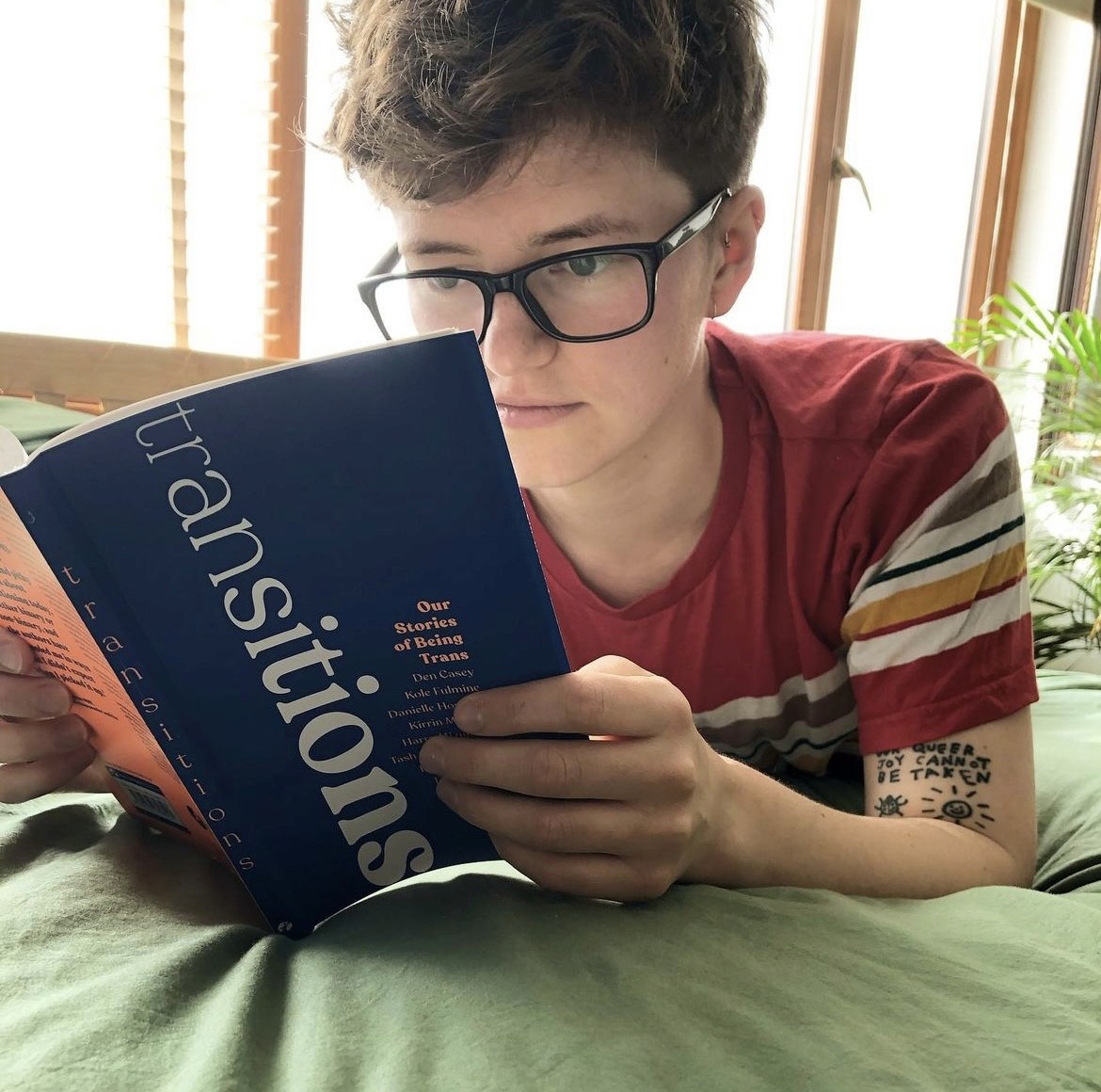
That’s amazing. And to come forward to the present day — where have you found joy this past week?
I had an incredible cinnamon roll today. I'm going to put that out there as one of my moments of joy this week!
Also, after going to the Big Queer Picnic in Cardiff recently, we went to our friends' house. They have an eight-year-old, and we decided to dye a patch in my hair blue.
They've become a real trans family to us. It was just really wholesome to be a part of that and then, you know, tuck their kid into bed and read stories — that would be my recent moment of joy.
Within the book, you write about your transition in seasons, which I loved. Have you always viewed transition in seasons, and how did that realisation happen? Why did you make the choice to structure the book in this way?
When I was writing, I found that my journey didn’t follow a typical beginning, middle and end. It's more like layers — revisiting the same parts of yourself and realising that they've changed. My life didn't fit neatly into a before and after picture, which is quite often how transition is viewed by people — “this was me before, and this is me now, finished.”
But for me, it’s always going to be continuing; it’s not something that's ever going to be finished. And I write about that in the book and about how, when I look back, there are moments that are really key to my transness that I didn't even know at the time. It doesn't follow a logical chronological order; it’s more like loads of layers and loads of stories, and I guess that's where the seasons came from.
And the change of the seasons is something that I really love and that I'm trying to embody more in my life — you know, slowing down in winter and being outside more in summer. I guess everyone thinks it's going to be a before and after, but in reality, it doesn’t pan out like that. I don't think that the me that I am now is the finished me. I love all the versions of myself for different reasons.
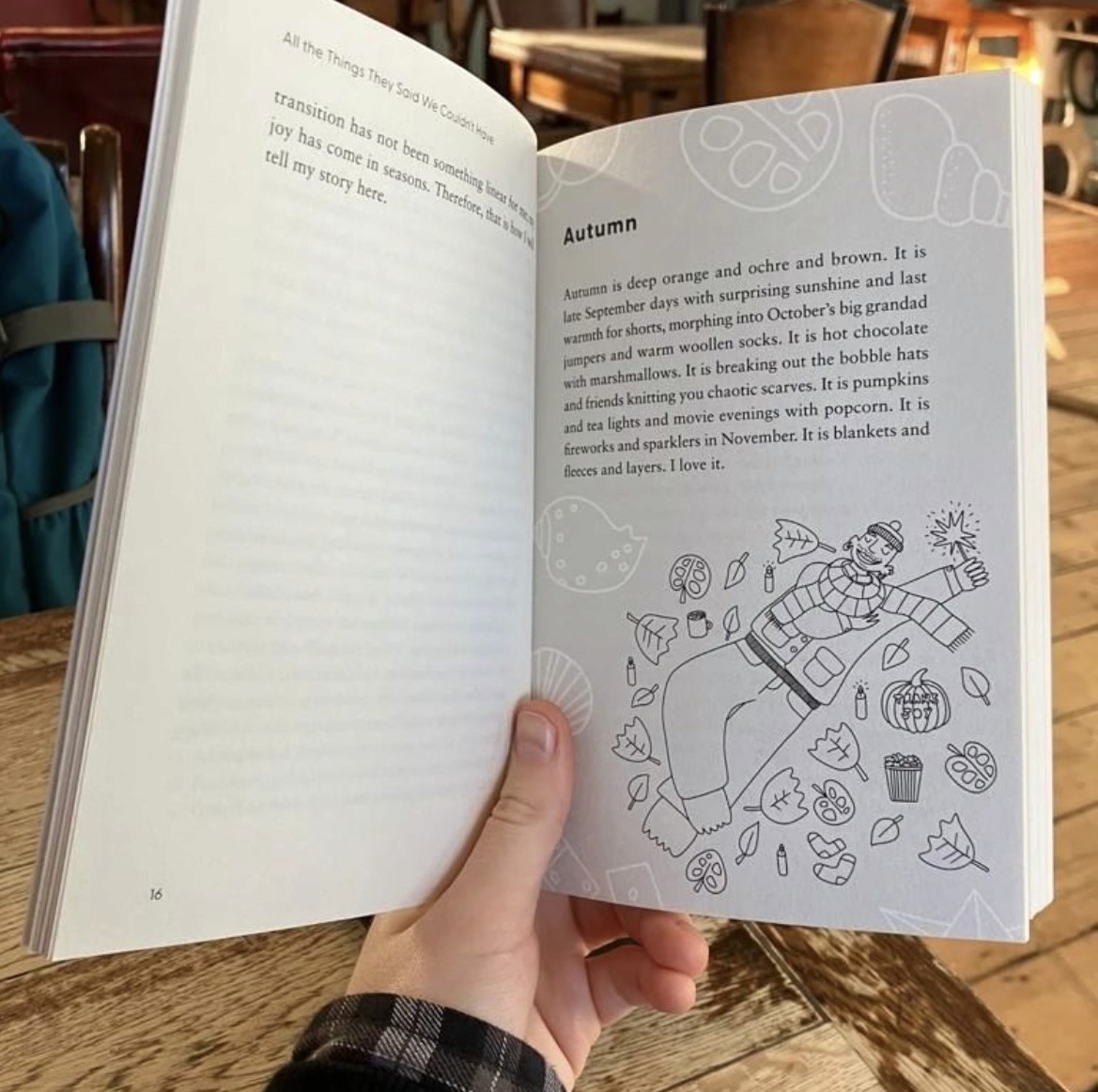
Something that struck me when I was reading your book was the way you wrote about friendship and community, especially among trans people. The way I felt reading your book is the way I feel watching sitcoms, where you fall in love with a group of friends and, in turn, want to be part of their group! How do trans people who don’t have that sense of community, and who feel lonely find joy in their lives?
I grew up in a place where I didn't know anyone else who was trans, and I wasn't out then either. And it's really hard. It's really hard to feel like you don't have that, and lots of people have reached out and said, “it's amazing that you have this, but I don't feel like I have it”. And my answer is often that people are there, even if you don't know them yet.
I always say about queer people, but especially about trans people, that if you make spaces, trans people will come. Like bees to a hive. If you make the space and you make it safe, people will come. There are trans spaces popping up everywhere, and I would definitely recommend that people get to those if they can.
But in terms of finding joy in your own space, I am a big nature person. I love to get outside. I like to notice the small things, and it feels cringe to be like, “oh yeah, I like to go for a walk and look at the leaves”. But it actually is really lovely, and there are so many examples of transness and being able to dream and change into something else and allow the parts of yourself that you want to exist to exist outside in nature. Finding those little spaces for that can be a saving grace.
And it's much easier for me to say this now that I do have community and now that I do have an amazing group of friends, but I think there is so much space for joy in between all the bad stuff. And I say this in the book — joy is different from happiness. You can have a really terrible material situation and still find pockets of joy. Even when I was a really unhappy, closeted trans person, I still had moments of trans joy, even though I didn't necessarily understand the full extent of it.
One of the things that I do is keep what I call a happy book, where I write three things every day that made me happy or made me feel joy. And that's something I've done for a really long time, and that helps me just before I go to bed to focus on three things that stuck out from the day that were good. They’re not always the most exciting things. It can just be “it was sunny”.
It's not always easy to find those things, but prioritising joy and sharing those stories to combat the huge deluge of misery that surrounds being trans is so important. And now I'm really grateful for the fact that I'm trans, and I wouldn't change it for the world.
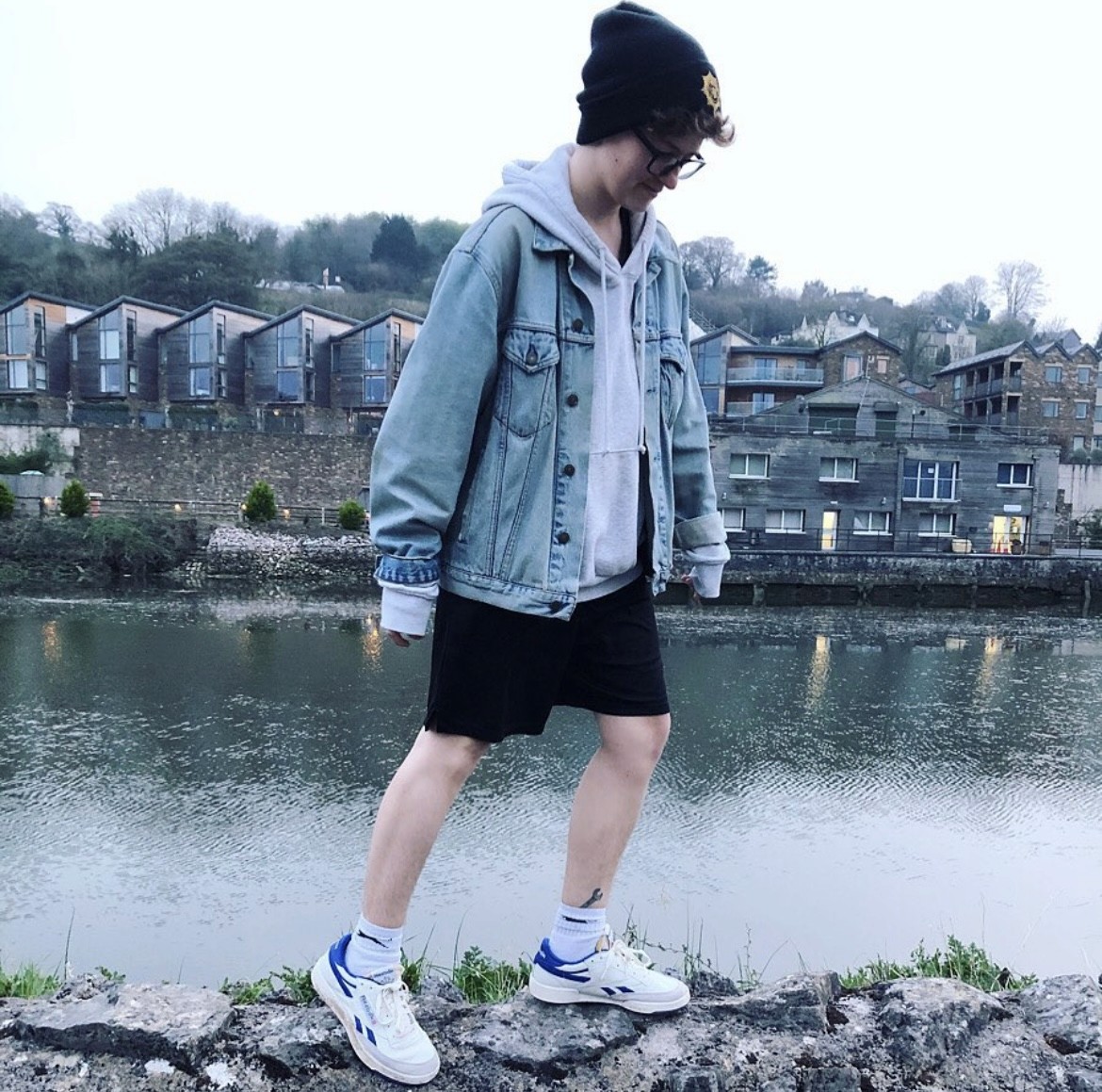
We often talk about allies — what cis people can do to support trans people. But your book really highlighted the beauty of trans people supporting one another. In what way can trans people support those newer to the community, or to transition?
One of the things that I struggled with, coming out as queer and coming out as trans, was not seeing older trans people who were okay and happy. I used to think that if you're trans, you can't have a job because I don't know any trans people with jobs, or if you're trans, you can't have a family, because I don’t know any trans people with families. Whereas now, I see those people, I know that they exist.
We've been told that we can't have things, but actually, those things exist because we've made them exist. We have enacted them into reality. So I think visibility is really important.
There's a part in the book about a friend, an older friend, who is in their sixties. And it’s wild because they were thanking us for being there and being who we are, and we were thanking them for proving that it's never too late to come out. It’s all tangled up in the becoming of each other. So I think just being as much yourself as you can in the spaces where it's safe to do so.
Also, you’ll see trans people, even in situations of great poverty, passing around the last £5 between all the GoFundMe pages. The level of generosity that I see in the trans community is incredible. When I'm looking at GoFundMe pages, oftentimes it’s trans community members who are posting and donating to each others, and I think that's so lush.
And if you don't have the ability for financial stuff — which I definitely don't think is the most important thing — something that I've noted is that trans people, even when they're in dire straits, will still be incredibly generous in the sharing of creativity and art. I have so many incredibly talented trans friends who send art in the post just because, or send a book just because they've been thinking of you. And our entire house is covered in artwork from different trans people that we know.
This is what I mean about your friendship group feeling like a sitcom!
And I feel like that too! I’m like, “wow, what is this?” And I was talking to my partner about this and asking them why they think it is that we have formed such relationships, and we were talking about how often you lose so many relationships when you come out, which makes the relationships that you gain so precious, you treat them in a different way.
Friendships and chosen family are so crucial. Being able to almost romanticise your relationships, be excited about your friends, and be joyful about the things that happen are so important.
At what point in your own transition do you feel you would have needed this book the most?
Probably when I was starting to really think about the fact that this was something that I wasn't going to be able to escape. It wasn't something I could turn off. I'd been trying to for a really long time, and I think I didn't have the language when I was younger to understand how I was feeling. But when I did have that language, it became increasingly difficult to run away from it.
There was very much a narrative where I was proud to be queer, but this was a step too far. This is something I did not want. I wanted to just be cis; I wanted to just follow the road that I was supposed to follow. I didn’t want to be trans.
There’s a scene in the film Pride, which I write about in the book, where Joe’s mum says, “it’s such a miserable life, Joe. It's such a lonely life.” And that’s what I thought being trans was. That is what I thought it would be.
Even when I started to access care and got my top surgery, I told myself I would never take off my shirt in front of anyone again. That I’d hide that part of myself. And now I take my shirt off all the time, I go swimming, I’m very open.
I wish I’d read then about the propensity for joy and happiness. And rather than seeing transness as a burden, seeing it as a courage, a bravery to be the self that makes you feel most free and most you, and run towards it rather than this idea that you are pushing away from what society's given you. That is courage, and actually, so much of being trans is about courage and expansion and pushing beyond what you've been given and taking what you've been given and shaping it and moulding it into something that is yours.
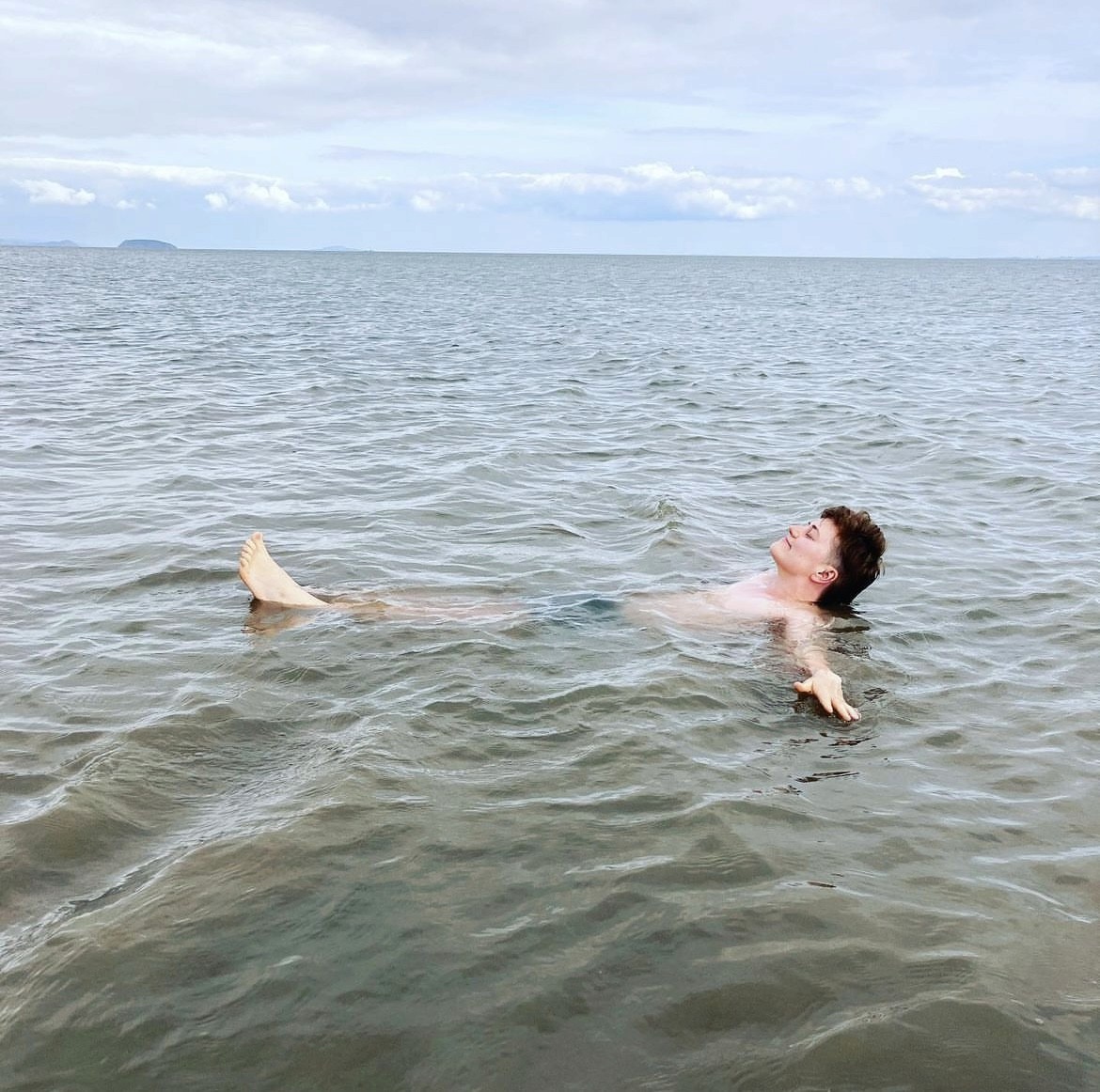
Did writing about your experiences give you any new insights that you didn’t have while you were living them?
Definitely. It’s probably been two years now since I wrote the book because it’s a long process from writing it to it being on the shelf. And I look back over the last two years and realise that I could probably fill a whole other book with things that have happened since then.
And that's a nice feeling — that this is something that will just keep going and expanding. For me, that's how I see life now — in a much more joyful way, and I treasure those moments and think about them in the way that I would tell a story about them. Storytelling is such a powerful tool and such a powerful thing that we have.
One of the things that I learned while writing the book was that we always have the power to tell our stories. And it doesn't necessarily mean that the whole world will read them, but some people will read them.
I get messages from people who I knew when I was a kid who picked up the book, or a message from someone in Canada who read it, or a youth worker in South Africa who I knew as a child who's gone and bought the last copy in the book shop. And my story is going to those people, even if it doesn't go to everyone.
And that is a power that I hold, and now it’s a power that other people hold — buying something that's about trans joy.
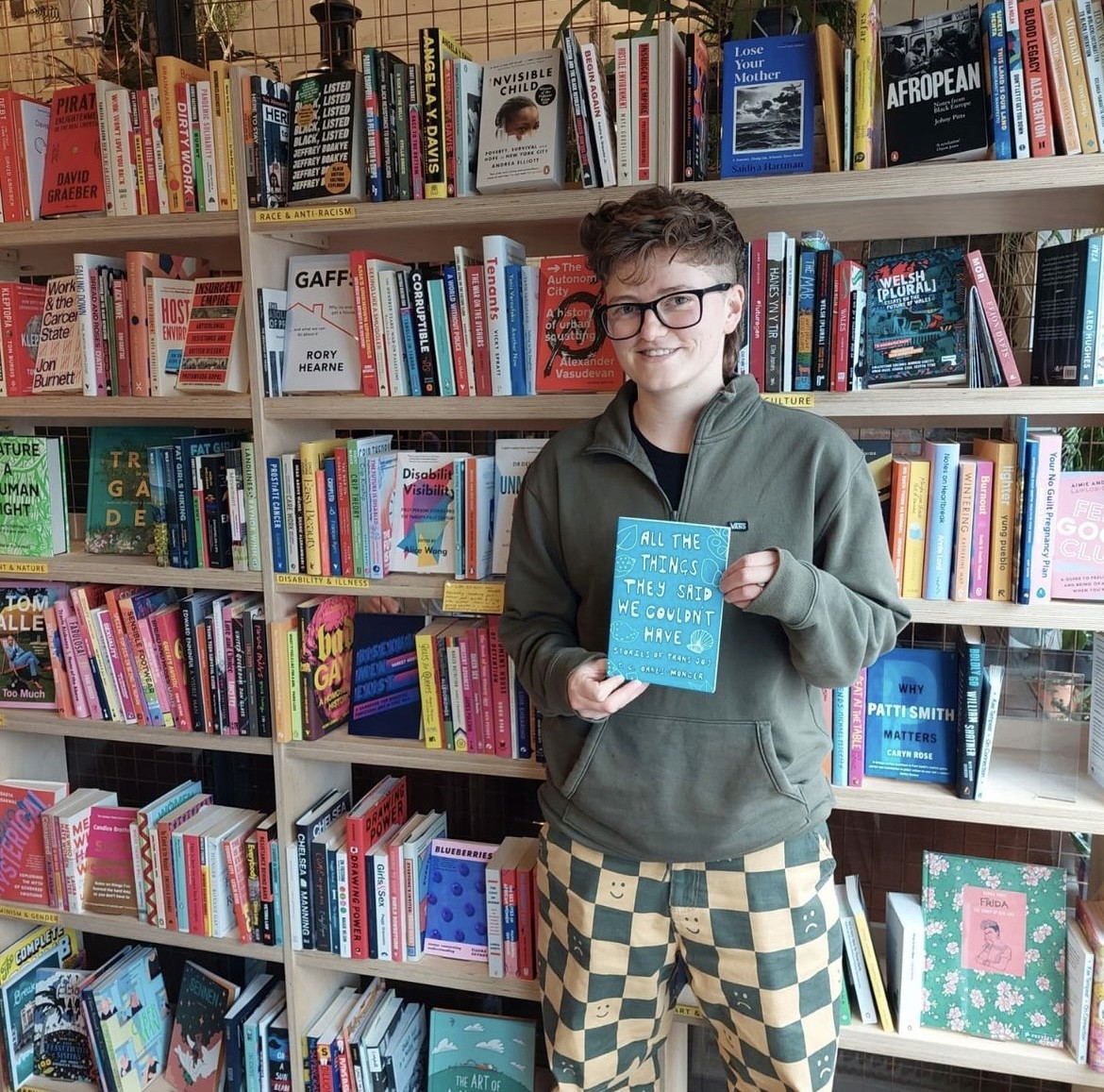
In a time where trans people are the victims of so much hate and scrutiny, how do we balance conversations about the dire situations that many trans people face with talking about trans joy? How do we make sure that one conversation doesn’t monopolise or erase the other?
I think to start with, we have to recognise that it's not transness that is miserable and painful and difficult — it's transphobia. When you exist in a world that makes life difficult for trans people, it can feel like being trans is the thing that is difficult.
Trans joy is not about diminishing the negative experiences that trans people go through. It's about how the good and the bad can coexist and how, even in these terrible circumstances, we can still be the most incredible people and have the most incredible experiences.
I started to find it really hard, going on social media and seeing how many devastating stories were circulating all the time. There's so much grief in our community, especially for young trans kids who are coming into a world that is probably abjectly worse than when I grew up. We may have gone under the radar then a bit more because it wasn't so known, but now there's so much conversation about it and so much damage for that reason.
And I had this really upsetting but amazing moment a few weeks ago where I was in a cafe and there were two older guys talking on the table next to me who were saying negative things about trans people — you could have gotten any of them out of a tabloid headline. And I heard them, and the first thing I felt was that these people were a threat. The gut instinct inside of me wanted to walk away and think, “oh, they're just nasty people who don't understand, saying these violent, violent things.”
But I actually made the decision to go over and talk to them. And I said, “I'm one of those people you're talking about, and I would love to sit down and chat with you.” And they invited me to sit down. We had this hour and a half-long chat about being trans and how the headlines only tell one side of the story about all of these incredible, more nuanced conversations.
They weren’t mean-spirited. They didn't have anything fundamentally against trans people. They just had all of this misinformation, and they believed everything in the press. So I think we have to make space for our own stories, and sometimes that will be the grief and the agony of being trans in a world that doesn't want trans people to exist. But it also needs to be the spaces where we are allowed to thrive and be and have joy.
Surrounding trans people with stories that are miserable is very harmful for our mental health. I think it's important that cis people are having those conversations, highlighting those things and fighting them, but trans people can't receive that negativity all day, every day, and not be affected by it. And that's where I think joy has to be platformed.
And finally, what was a question you had about gender or trans identities in your youth, and could you answer it now for anyone who may be wondering the same thing?
One thing I would say to my younger self is that everyone's going to tell you it gets better, and it's going to take a really long time, and you're going to stop believing that things get better. But after ten years, things do get better.
I think the other thing would be that you know best how to just be yourself already. You are already doing gender in your own way, and people will tell you that you're doing it wrong, and you will feel like you're doing it wrong because of how other people treat you. But one day you will feel like it matters a lot less what other people think.
And you will not be alone. There are so many people who you haven't even met yet, who you are going to love, and who are going to love you. You will not be alone.
Getting Intimate is the blog series where we interview people making a difference in the world of sex, relationships, gender and feminism. Read more interviews here.
If you want to learn more about Tash and their work, check them out on Instagram (@tcoakesmonger)
For more sex and relationships content, follow My Body & Yours on Instagram (@mybodyandyours)
Interview Date:
June 20, 2023
